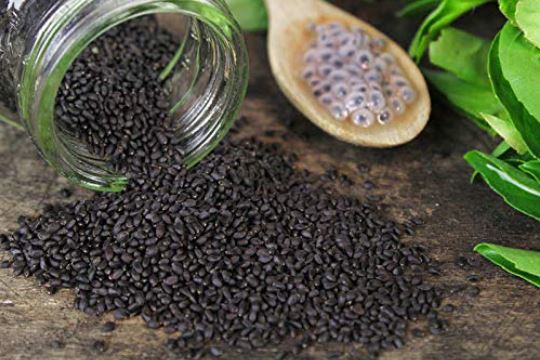Lifestyle
8 surprising health benefits of Basil seeds

You must have probably tasted basil seeds in many desserts and drinks like falooda and sherbet.
These basil seeds come from the sweet basil plant (Ocimum basilicum L.) which is different from the Holy basil or tulsi plant. Basil seeds, are tiny, black oval-shaped seeds that are loaded with nutrients and provide umpteen of health benefits.
Basil seeds have been used in traditional medicine for the treatment of diarrhoea, ulcer, dyspepsia and other illnesses. They are also used as a diuretic, antispasmodic, stomachic and antipyretic.
Basil seeds contain protein, fat, fibre, carbohydrates, water and ash. They are a good source of minerals such as magnesium, iron, zinc and manganese.
Basil seeds also contain phenolic compounds like rosmarinic, caftaric, caffeic, chicoric, p‐hydroxybenzoic, p‐coumaric, protocatechuic acid and rutin. Basil seeds and chia seeds look quite similar, but they are different in many ways.
Here are 8 health benefits of basil seeds:
1. Aid in weight loss
Basil seeds contain soluble dietary fibre which helps keep your stomach full for longer and provides a feeling of satiety. A study showed that obese patients who consumed 2 g of sweet basil seeds extract with 240 ml of water before lunch and supper had a significant decrease in body mass index (BMI). However, this was seen among high dose users who consumed more than 50 per cent of the extract.
2. Improve blood sugar
Basil seeds are considered good for diabetes patients. The soluble dietary fibre present in basil seeds helps control blood sugar levels which is effective for patients with type 2 diabetes mellitus. Consumption of soluble dietary fibre also decreases the risk of developing diabetes.
3. Decrease cholesterol levels
Consumption of basil seeds can be good for your heart too. The fibre content in them can aid in lowering LDL (bad) cholesterol and increasing HDL (good) cholesterol. This reduces the risk of heart disease.
4. Increase energy levels
Basil seeds are a good source of iron, an essential mineral required for blood production. Iron is an important component of haemoglobin, a substance in red blood cells (RBCs) that transports oxygen throughout the body and helps in providing energy to the body. Lack of iron in the body causes fatigue and irritability.
5. Support bone health
Magnesium found in basil seeds plays an important role in maintaining healthy bones. Increased intake of magnesium has been shown to increase bone mineral density and helps prevent the onset of osteoporosis.
6. Treats common cold
The presence of zinc in basil seeds can help strengthen the immune system and treat common cold. It can lower the duration and severity of cold symptoms by acting as an astringent on the trigeminal nerve.
7. Improve brain function
Basil seeds contain manganese, an essential mineral needed for healthy brain function. It binds to neurotransmitters and triggers the movement of electrical impulses throughout the body, resulting in the proper functioning of the brain.
8. Help in digestion
When basil seeds are soaked in water they swell up and produce a gelatinous mass due to the polysaccharide layer present on the outer epidermis wall of the seed. This gelatinous substance and the presence of dietary fibre in basil seeds have been shown to aid in the digestion process.






